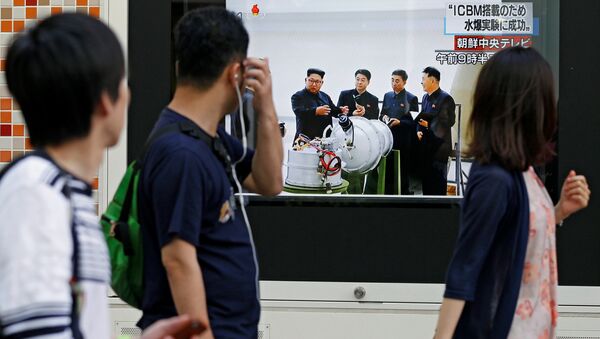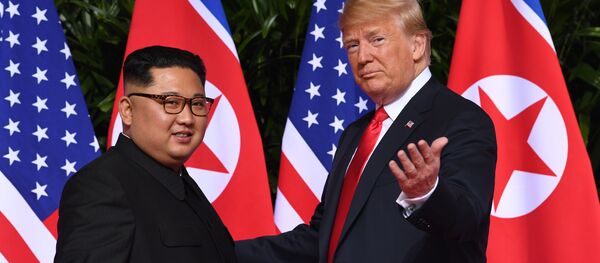On Monday, Defense Department spokeswoman Dana White in a press release said the United States and South Korea have suspended planning for a joint military exercise near the Korean Peninsula that was scheduled to take place in August.
Trump has been criticized by figures such as ex-CIA chief General Michael Hayden and Senate Minority Leader Chuck Schumer for agreeing at his Singapore talks with Kim on June 12 to halt the massive annual joint exercises without winning any comparable concession from Kim in return.
No Surrender
Independent Institute Center for Peace & Freedom Director Ivan Eland told Sputnik that concessions appeared to be a setback for Trump and he cautioned that it would not persuade Kim to abandon his nuclear development program.
"I doubt if Kim will actually give up his nuclear weapons and missiles," Eland said. "The bad news is that he will likely not give up his programs. The good news is that Kim has proven that he is not irrational or crazy and can be deterred."
Eland also said that Hayden and Schumer appeared to be correct in their assessment on what Kim would and would not do following the summit. Trump, he explained, gave away unspecified security guarantees while Kim won a meeting with the most powerful man in the world.
The agreement that Trump had made with Kim was very general and a long, slow process of difficult negotiations would be needed to produce a viable agreement on denuclearization, following the Singapore meeting, Eland cautioned.
Eland also questioned the commitment of both Trump and Kim to a serious and sustained denuclearization process.
"If they [Trump and Kim] are both sincere, a viable implementation plan could take a long time, because it would be technical and actually denuclearizing by dismantling and removing facilities could take a decade or more," he said.
'Vague' Agreement
University of California Santa Cruz Professor Christine Hong, a member of the Korea Policy Institute, told Sputnik that efforts to reach an agreement had just begun. But she advised that because of this, the vague wording of the Singapore might aid the negotiating process rather than hinder it.
"What the American media holds out as a weakness, the thinness of the Singapore joint statement, also could be interpreted as a sign of strategic flexibility at a delicate early stage of negotiation between the United States and North Korea," she said.
"Americans need to realize that peace is not just a North Korean agenda. It is the desire of the Korean people north and south of the DMZ and in the diaspora," she said.
South Korean President Moon Jae-in commanded an 85 percent approval rating for his North Korea policy and the day after the Trump-Kim summit, conservatives were overwhelmingly defeated in South Korea’s midterm elections, giving Moon a stronger mandate to push for peace, Hong said.
Meanwhile, South Korean First Vice Foreign Minister Lim Sung-nam said during a forum in Washington, DC on Monday that specific action plans are needed to ensure North Korea denuclearizes.



